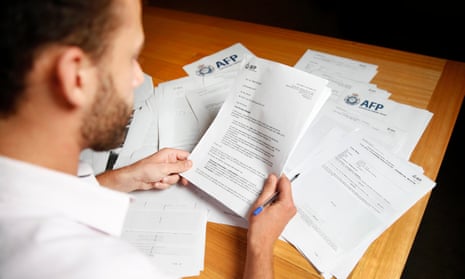The Australian federal police have admitted they sought access to a Guardian reporter’s metadata without a warrant in an attempt to hunt down his sources.
It is the first time the AFP has confirmed seeking access to a journalist’s metadata in a particular case.
The admission came to light when the AFP told the privacy commissioner it had sought “subscriber checks” and email records relating to the Guardian Australia journalist Paul Farrell, and the correspondence was sent to Farrell by the office of the Australian information commissioner.
Earlier this year Guardian Australia reported that the AFP had accrued a file of at least 200 pages on Farrell in an attempt to uncover and prosecute his confidential sources.
The file contained a heavily redacted dossier of operational centre meeting minutes, file notes, interview records and a plan for an investigation the AFP undertook into one of his reports.
The new correspondence was sent to Farrell after he lodged a complaint under the Privacy Act to gain access to parts of the AFP files that had been redacted. The privacy commissioner accepted the complaint and began an investigation.
In the course of the investigation, the AFP provided submissions to the privacy commissioner that were passed to Farrell, including an admission that the AFP had sought “subscriber checks” relating to him.
The AFP’s submission said: “You will see that exemptions have been claimed under s47E(d) and s37(2)(b) on some folios. These exemptions primarily relate to e-mail and other subscriber checks relating to Mr Farrell, and examination of meta data associated with some electronic files.”
A “subscriber check” is a request to telecommunications companies for access to information they may hold on a particular person. It can only be made under the Telecommunications (Interception and Access) Act 1979.
A spokesman for the AFP declined to comment on whether the agency may have violated Farrell’s privacy by accessing his metadata, citing telecommunications laws.
“The provisions of the Telecommunications (Interception and Access) Act 1979 (TIA Act) strictly regulate the disclosure of information,” an AFP spokesman said.
“Outside of specific exceptions, none of which apply in these circumstances, it may constitute an offence under the TIA Act for the AFP to provide information in answer to these queries.”
The AFP have undertaken a number of investigations targeting journalists’ sources, many related to stories about asylum seeker operations. The investigations have drawn criticism from press freedom groups, and raised concerns that journalists’ phone and web metadata may have been accessed in the course of these investigations.
It is not clear what form of email checks were undertaken by the AFP, or whether officers sought warrants to access this information. Generally the content of emails would be accessible only with a warrant.
The access requests to telecommunications companies were made in 2014, before amendments were passed requiring the AFP to seek warrants to access a journalist’s information.
The AFP has previously confirmed generally that it had accessed journalists’ metadata but said such requests were “rare”.
The AFP told Guardian Australia in February it had not accessed any journalists’ data since October 2015. “The AFP has not accessed or applied to access the metadata information belonging to any journalist since 13 October 2015, when new legislation came into effect.”
The CEO of the journalists’ union, the Media Entertainment and Arts Alliance, Paul Murphy, said he was appalled by news that the AFP had sought access to Farrell’s metadata.
“It comes down to this: journalists writing legitimate news stories in the public interest now have police trawling through their private metadata all because a government agency is embarrassed about a leak,” Murphy said. “In the process, the rights of journalists are trampled on.
“The public’s right to know what governments do in our name is being overridden by public servants seeking to cover up a scandal in order to persecute and prosecute a whistleblower. It makes a mockery of open and transparent government. This news, coming as it does just weeks before UNESCO World Press Freedom Day on May 3, shows the contempt being shown for the principles of press freedom.”









Comments (…)
Sign in or create your Guardian account to join the discussion